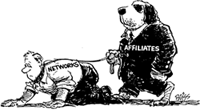 In the previous post I offered some ideas for using the web and related technologies to “connect” with local radio listeners and advertisers. I took a nap and had a sub sandwich and now I’m ready make a list for network affiliate relations. What is that you ask?
In the previous post I offered some ideas for using the web and related technologies to “connect” with local radio listeners and advertisers. I took a nap and had a sub sandwich and now I’m ready make a list for network affiliate relations. What is that you ask?
From the mid-eighties to the late nineties, part of my job was “selling” our network services to radio stations. We provided news and and sports programming in exchange for commercials on the local station, which we in turn tried to sell. The trick was to keep the stations you had while adding new stations when and where you could.
I drove all over half a dozen states, meeting with station managers, program directors and news directors. For the most part, this was pre-consolidation and I was talking to the station owner or a manager who was almost completely autonomous. They could make a decision without checking with anyone up the food chain. They were at or near the top of that chain. No longer the reality.
Where was I? Oh. How would I use today’s communication and publishing tools if I were doing that job? First, I’m not sure I would have the balls to do what I’m about to propose. There would be some risk. As much as doing business “the old way?” Don’t know. And, fortunately, no longer my call. But here goes:
Blogging
I’d create the “MyState Radio Network Affiliate Relations Blog.” It would be right out there on the web with the rest of the blogs. No password. The target audience would be the men and women that worked at radio stations affiliated with our network. Topics would include (but not be limited to): Programming, Sales, Traffic, etc. We’d talk about how stations use the network programming and why they sometimes don’t (it’s called clearance).
That sound you hear is the first alarm going off. If we publically acknowledge that some of our affilaites don’t air all of our programming, an advertiser might read the post and become concerned. Fact is, the advertisers already know that or can find out easily enough. By engagaing our affiliates in a frank and open discussion of this topic, we might learn something that could help us improve our clearance.
I’d let stations know about upcoming advertising campaigns and –where possible– offer suggestions on how they can take advantage of this locally. The traditional fear is that if they stations know –in advance– some of them might do or say something that could torpedo the network buy. Not much trust there.
I’d open up the comments and encourage the stations to let us know what they think about what we’re doing. If I got a hot one, I’d jump on the phone (or in my car) and deal with it.
What would an advertiser think of this public exchange? Not sure. We might get some points for being open and transparent. Nothing to hide. Radio stations might take the same view.
Here at the end of 2005 we communiate with our affiliates using the web, email, fax, telephone and in-station visits. All good and all necessary. And safe. Or at least the illusion of safety and control. Whatever the stations think and say about us, they’re thinking and saying. It’s critical to get them to say it to me and say it early.
Podcasting
I’d do a weekly podcast targeted at affiliates but out there for anyone to listen to. Who would I chat with? My news staff; my affiliate relations reps; my sales manager and his account execs; station managers, program directors and news directors… anybody and everybody involved in this business. We’d talk about anything and everything. If we –the network– does something really stupid, we hang it out there and talk about it. Why we did it. How we might do it differently in the future. What if an advertiser heard one of these? Great. If the “conversation” is going to take place, I want to be in on it.
As I said at the beginning of this post, I’m not sure I’d have the nerve to try such…”non-traditional” tactics. I’m not aware of any networks that are but if you know of one, send me a link.
